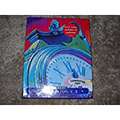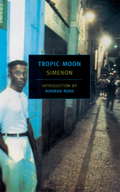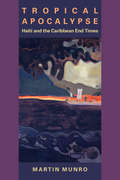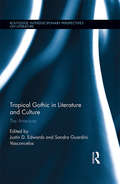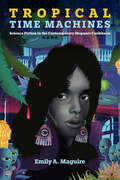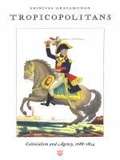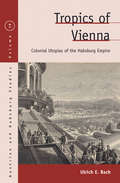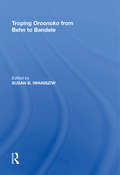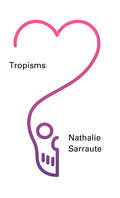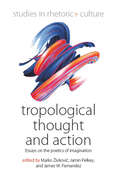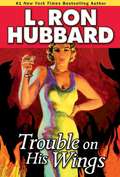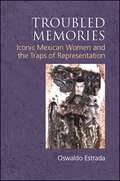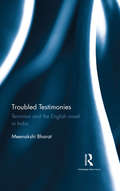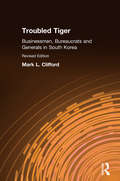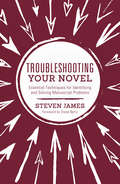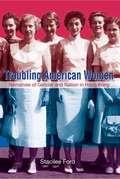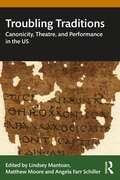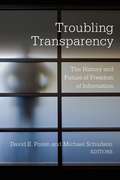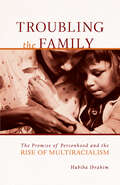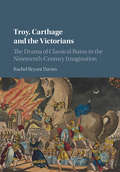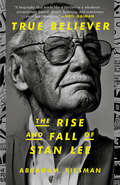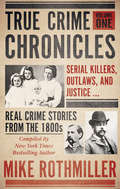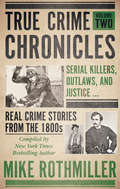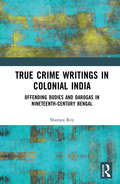- Table View
- List View
Tropic Moon
by Georges Simenon Norman Rush Marc RomanoNewly translated for this edition.A young Frenchman, Joseph Timar, travels to Gabon carrying a letter of introduction from an influential uncle. He wants work experience; he wants to see the world. But in the oppressive heat and glare of the equator, Timar doesn't know what to do with himself, and no one seems inclined to help except Adèle, the hotel owner's wife, who takes him to bed one day and rebuffs him the next, leaving him sick with desire. But then, in the course of a single night, Adèle's husband dies and a black servant is shot, and Timar is sure that Adèle is involved. He'll cover for the crime if she'll do what he wants. The fix is in. But Timar can't even begin to imagine how deep.In Tropic Moon, Simenon, the master of the psychological novel, offers an incomparable picture of degeneracy and corruption in a colonial outpost.
Tropical Apocalypse: Haiti and the Caribbean End Times (New World Studies)
by Martin MunroIn Tropical Apocalypse, Martin Munro argues that since the earliest days of European colonization, Caribbean-and especially Haitian-history has been shaped by apocalyptic events so that the region has, in effect, been living for centuries in an end time without end. By engaging with the contemporary apocalyptic turn in Caribbean studies and lived reality, he not only provides important historical contextualization for a general understanding of apocalypse in the region but also offers an account of the state of Haitian society and culture in the decades before the 2010 earthquake. Inherently interdisciplinary, his work ranges widely through Caribbean and Haitian thought, historiography, political discourse, literature, film, religion, and ecocriticism in its exploration of whether culture in these various forms can shape the future of a country. The author begins by situating the question of the Caribbean apocalypse in relation to broader, global narratives of the apocalyptic present, notably Slavoj Zizek's Living in the End Times. Tracing the evolution of apocalyptic thought in Caribbean literature from Negritude up to the present, he notes the changes from the early work of Aimé Césaire; through an anti-apocalyptic period in which writers such as Frantz Fanon, Antonio Benítez-Rojo, Édouard Glissant, and Michael Dash have placed more emphasis on lived experience and the interrelatedness of cultures and societies; to a contemporary stage in which versions of the apocalyptic reappear in the work of David Scott and Mark Anderson.
Tropical Gothic in Literature and Culture: The Americas (Routledge Interdisciplinary Perspectives on Literature)
by Justin D. Edwards Sandra G.T. VasconcelosTropical Gothic examines Gothic within a specific geographical area of ‘the South’ of the Americas. In so doing, we structure the book around geographical coordinates (from North to South) and move between various national traditions of the gothic (Mexico, Argentina, Brazil, etc) alongside regional manifestations of the Gothic (the US south and the Caribbean) as well as transnational movements of the Gothic within the Americas. The reflections on national traditions of the Gothic in this volume add to the critical body of literature on specific languages or particular nations, such as Scottish Gothic, American Gothic, Canadian Gothic, German Gothic, Kiwi Gothic, etc. This is significant because, while the Southern Gothic in the US has been thoroughly explored, there is a gap in the critical literature about the Gothic in the larger context of region of ‘the South’ in the Americas. This volume does not pretend to be a comprehensive examination of tropical Gothic in the Americas; rather, it pinpoints a variety of locations where this form of the Gothic emerges. In so doing, the transnational interventions of the Gothic in this book read the flows of Gothic forms across borders and geographical regions to tease out the complexities of Gothic cultural production within cultural and linguistic translations. Tropical Gothic includes, but is by no means limited to, a reflection on a region where European colonial powers fought intensively against indigenous populations and against each other for control of land and resources. In other cases, the vast populations of African slaves were transported, endowing these regions with a cultural inheritance that all the nations involved are still trying to comprehend. The volume reflects on how these histories influence the Gothic in this region.
Tropical Time Machines: Science Fiction in the Contemporary Hispanic Caribbean (Reframing Media, Technology, and Culture in Latin/o America)
by Emily A. MaguireHow writers and artists use science fiction to speak to the current moment in the Caribbean Exploring the remarkable recent increase in works of science fiction originating in Spanish-speaking parts of the Caribbean and their diasporas, Tropical Time Machines shows how writers, filmmakers, musicians, and artists are using the language of the genre to comment on the region’s history and present-day realities. Discussing how previous Caribbean literature and film has characterized places including Cuba, Puerto Rico, and the Dominican Republic as “out of sync” with Western time, occupying a repeating or static space, Emily Maguire argues that science fiction breaks these cycles and resituates the region temporally and spatially. In chapters on cyberpunk, zombies, post-apocalyptic narratives, and the ab-real, Maguire shows how recent cultural production analyzes and critiques the ways globalization and national leadership have reinforced the region’s marginalization amid economic and climate crises. Art that employs the science fictional mode makes room for a new vision of the Caribbean, Maguire demonstrates—an alternate perspective in which the region has agency in shaping its own narratives and trajectories. The texts themselves are time machines, enabling creators to protest inequalities of the present from the point of view of an imagined, transformed future. A volume in the series Reframing Media, Technology, and Culture in Latin/o America, edited by Héctor Fernández L’Hoeste and Juan Carlos Rodríguez Publication of this work made possible by a Sustaining the Humanities through the American Rescue Plan grant from the National Endowment for the Humanities.
Tropicopolitans: Colonialism and Agency, 1688–1804
by Srinivas AravamudanIn Tropicopolitans Srinivas Aravamudan reconstructs the colonial imagination of the eighteenth century. By exploring representations of peoples and cultures subjected to colonial discourse, he makes a case for the agency--or the capacity to resist domination--of those oppressed. Aravamudan's analysis of texts that accompanied European commercial and imperial expansion from the Glorious Revolution through the French Revolution reveals the development of anticolonial consciousness prior to the nineteenth century. "Tropicalization" is the central metaphor of this analysis, a term that incorporates both the construction of various dynamic tropes by which the colonized are viewed and the site of the study, primarily the tropics. Tropicopolitans, then, are those people who bear and resist the representations of colonialist discourse. In readings that expose new relationships between literary representation and colonialism in the eighteenth century, Aravamudan considers such texts as Behn's Oroonoko, Defoe's Robinson Crusoe and Captain Singleton, Addison's Cato, and Swift's Gulliver's Travels and The Drapier's Letters. He extends his argument to include analyses of Johnson's Rasselas, Beckford's Vathek, Montagu's travel letters, Equiano's autobiography, Burke's political and aesthetic writings, and Abbé de Raynal's Histoire des deux Indes. Offering a radical approach to literary history, this study provides new mechanisms for understanding the development of anticolonial agency. Introducing eighteenth-century studies to a postcolonial hermeneutics, Tropicopolitans will interest scholars engaged in postcolonial studies, eighteenth-century literature, and literary theory.
Tropics of Vienna: Colonial Utopias of the Habsburg Empire (Austrian and Habsburg Studies #19)
by Ulrich E. BachThe Austrian Empire was not a colonial power in the sense that fellow actors like 19th-century England and France were. It nevertheless oversaw a multinational federation where the capital of Vienna was unmistakably linked with its eastern periphery in a quasi-colonial arrangement that inevitably shaped the cultural and intellectual life of the Habsburg Empire. This was particularly evident in the era's colonial utopian writing, and Tropics of Vienna blends literary criticism, cultural theory, and historical analysis to illuminate this curious genre. By analyzing the works of Leopold von Sacher-Masoch, Theodor Herzl, Joseph Roth, and other representative Austrian writers, it reveals a shared longing for alternative social and spatial configurations beyond the concept of the "nation-state" prevalent at the time.
Troping Oroonoko from Behn to Bandele
by Susan B. IwanisziwThis volume of essays invites the reader to assess literary texts from within the frame of the texts' cultural history, which includes issues of authorship and literary or stage convention as well as the social and political institutions that shaped and marketed that literature. The collection initiates just such an in-depth and focused analysis of the complex literary and social history of the royal slave Oroonoko. All eight essays address elements in the evolution of Oroonoko, from Behn's 1688 novella to Southerne's 1696 dramatic adaptation, and thence to the adaptations by Hawkesworth (1759), Gentleman (1760), Anonymous (1760), Ferriar (1788), Bellamy (1789) and Bandele (1999), who serially expropriated the play as a platform to debate responsibility in matters of slavery and colonialism. Perhaps unique among literary creations, Oroonoko and his entourage, with their distinctive race, class and gender attributes, came into popular consciousness as tropes gauging important shifts in English values during the course of the transatlantic slave trade. Accordingly, this study aims to provide a specific exemplum of rigorous, focused research on a single, complex and controversial topic but also to complicate some of our received notions about Oroonoko, slavery and abolition with a view to encouraging a more rigorous analysis of the cultural history underpinning literary texts. .
Tropisms
by Maria Jolas Nathalie SarrauteNathalie Sarraute's stunning debut--vignettes of "inner movements"--foreshadowed the rise of the nouveau roman. Hailed as a masterpiece by Jean Genet, Marguerite Duras, and Jean-Paul Sartre, Tropisms is considered one of the defining texts of the nouveau roman movement. Nathalie Sarraute has defined her work as the "movements that are hidden under the commonplace, harmless instances of our everyday lives." Like figures in a grainy photograph, Sarraute's characters are blurred and shadowy, while her narrative never develops beyond a stressed moment. Instead, Sarraute brilliantly finds and elaborates subtle details--when a relationship changes, when we fall slightly deeper into love, or when something innocent tilts to the smallest degree toward suspicion.
Tropological Thought and Action: Essays on the Poetics of Imagination (Studies in Rhetoric and Culture #9)
by Jamin Pelkey Marko Živković James W. FernandezFrom twilight in the Himalayas to dream worlds in the Serbian state, this book provides a unique collection of anthropological and cross-cultural inquiry into the power of rhetorical tropes and their relevance to the formation and analysis of social thought and action through a series of ethnographic essays offering in-depth studies of the human imagination at work and play around the world.
Trouble on His Wings
by L. Ron HubbardExperience this thrilling tale. Johnny Brice is a hotheaded, hard-working "picture-chaser" for the newsreels. He loves to fly into the mouth of danger (whether forest fire, shipwreck or flood), get the story first, shoot it and send the film back fast so that it can be turned into newsreels for theatres all across America. He's the best there ever was as a "top dog" reporter . . . up till the day he inadvertently saves the life of a golden-haired girl he pulls out of the ocean while covering a ship burning at sea.The dame, or "Jinx," as Brice calls her, seems to bring bad luck like a black cat under a ladder. She keeps Brice on his toes and waist-deep in trouble as they trek the globe from Idaho to the Orient, chasing pictures for the World News. Trouble is, no matter how hard he tries or how good the story, Johnny can't seem to get good shots . . . nor can he shake the girl. "...colorful prose, lively action writing, exotic locales, fresh variation on standard characters and situations, and well-constructed plots." --Ellery Queen
Troubled Memories: Iconic Mexican Women and the Traps of Representation (SUNY series, Genders in the Global South)
by Oswaldo Estrada2019 CHOICE Outstanding Academic TitleIn Troubled Memories, Oswaldo Estrada traces the literary and cultural representations of several iconic Mexican women produced in the midst of neoliberalism, gender debates, and the widespread commodification of cultural memory. He examines recent fictionalizations of Malinche, Hernán Cortés's indigenous translator during the Conquest of Mexico; Sor Juana Inés de la Cruz, the famous Baroque intellectual of New Spain; Leona Vicario, a supporter of the Mexican War of Independence; the soldaderas of the Mexican Revolution; and Frida Kahlo, the tormented painter of the twentieth century. Long associated with gendered archetypes and symbols, these women have achieved mythical status in Mexican culture and continue to play a complex role in Mexican literature. Focusing on contemporary novels, plays, and chronicles in connection to films, television series, and corridos of the Mexican Revolution, Estrada interrogates how and why authors repeatedly recreate the lives of these historical women from contemporary perspectives, often generating hybrid narratives that fuse history, memory, and fiction. In so doing, he reveals the innovative and sometimes troublesome ways in which authors can challenge or perpetuate gendered conventions of writing women's lives.
Troubled Testimonies: Terrorism and the English novel in India
by Meenakshi BharatSince the 9/11 attacks terror has established its permeating hold on society’s psyche. Creative writing, a popular and visible cultural witness to the strain, has taken up this destabilization with remarkable regularity. Troubled Testimonies focuses on the Indian novel in English, deriving inspiration from these disturbances, to essay a unique grasp of the cultural make-up of the times and its reverberations on the sense of self and belonging to the nation. This first full-length study of terror in the subcontinental novel in English (from India) places it in the world context and analyzes the fictional coverage of the spread of terrorism across the country and its cultural fallout. The enigmatic coming together of the contemporary with the anguish of loss and betrayal unleashed by terror occasions a significant redefinition of the issues of trauma, conflict and gender, and opens a fresh window to Indian writing and the culture of the subcontinent, and a new paradigm in literary and cultural criticism termed ‘post-terrorism’. Lucid and thought provoking, this book will be useful to scholars and researchers of South Asian literature, cultural studies, postcolonial studies, history, politics and sociology.
Troubled Tiger: Businessmen, Bureaucrats and Generals in South Korea
by Mark L. CliffordThis analysis of modern Korea includes: the imprisonment and sentencing of two former presidents of South Korea for their role in the Kwangju uprising and on various charges of corruption; the death of Kim II Sung and the resultant North-South standoff; and recent labour and student protests.
Troubleshooting Your Novel: Essential Techniques for Identifying and Solving Manuscript Problems
by Steve Berry Steven JamesTake your story to the next level of excellence! You've completed the first draft of your novel--now what? Chances are, it's not perfect...at least not yet. In order to increase your chances of getting a literary agent, selling your manuscript to a publisher, or garnering an audience for your self-published work, you need targeted, practical instruction on tackling the problem areas and weak spots in your story. You need Troubleshooting Your Novel. In this hand-on, easy-to-use guide, award-winning author Steven James provides helpful techniques and checklists, timesaving tricks of the trade, and hundreds of questions for manuscript analysis and revision. You'll learn how to:ADJUST elements of story progression, from causality, tension, and setbacks to plot twists, climaxes, and endings.DEVELOP authentic, riveting characters by exploring their attitudes, desires, beliefs, and more.LEARN narrative techniques for elements such as dialogue, flashbacks, suspense, voice, subtext, and flow.ENSURE reader engagement by aligning with their expectations, fulfilling promises, and instilling trust.CHECK issues with context and continuity.You owe your book more than just a polish and a proofread. Strengthen your story, prepare it for the marketplace, and make it the best it can be with Troubleshooting Your Novel.
Troubling American Women
by Stacilee FordAmerican women have lived in Hong Kong, and in neighboring Macao, for nearly two centuries. Many were changed by their encounter with Chinese life and British colonialism. Their openness to new experiences set them apart, while their "pedagogical impulse" gave them a reputation for outspokenness that troubled others. Drawing on memoirs, diaries, newspapers, films, and other texts, Stacilee Ford tells the stories of several American women and explores how, through dramatically changing times, they communicated their notions of national identity and gender. Troubling American Womenis a lively and provocative study of cross-cultural encounters between the Hong Kong and the US and use of stereotypes of American womanhood in Hong Kong popular culture. Stacilee Fordhas lived in Hong Kong for 18 years. She teaches history and American studies at the University of Hong Kong.
Troubling Traditions: Canonicity, Theatre, and Performance in the US
by Lindsey MantoanTroubling Traditions takes up a 21st century, field-specific conversation between scholars, educators, and artists from varying generational, geographical, and identity positions that speak to the wide array of debates around dramatic canons. Unlike Literature and other fields in the humanities, Theatre and Performance Studies has not yet fully grappled with the problems of its canon. Troubling Traditions stages that conversation in relation to the canon in the United States. It investigates the possibilities for multiplying canons, methodologies for challenging canon formation, and the role of adaptation and practice in rethinking the field’s relation to established texts. The conversations put forward by this book on the canon interrogate the field’s fundamental values, and ask how to expand the voices, forms, and bodies that constitute this discipline. This is a vital text for anyone considering the role, construction, and impact of canons in the US and beyond.
Troubling Transparency: The History and Future of Freedom of Information
by Michael Schudson David E. PozenToday, transparency is a widely heralded value, and the U.S. Freedom of Information Act (FOIA) is often held up as one of the transparency movement’s canonical achievements. Yet while many view the law as a powerful tool for journalists, activists, and ordinary citizens to pursue the public good, FOIA is beset by massive backlogs, and corporations and the powerful have become adept at using it for their own interests. Close observers of laws like FOIA have begun to question whether these laws interfere with good governance, display a deleterious anti-public-sector bias, or are otherwise inadequate for the twenty-first century’s challenges.Troubling Transparency brings together leading scholars from different disciplines to analyze freedom of information policies in the United States and abroad—how they are working, how they are failing, and how they might be improved. Contributors investigate the creation of FOIA; its day-to-day uses and limitations for the news media and for corporate and citizen requesters; its impact on government agencies; its global influence; recent alternatives to the FOIA model raised by the emergence of “open data” and other approaches to transparency; and the theoretical underpinnings of FOIA and the right to know. In addition to examining the mixed legacy and effectiveness of FOIA, contributors debate how best to move forward to improve access to information and government functioning. Neither romanticizing FOIA nor downplaying its real and symbolic achievements, Troubling Transparency is a timely and comprehensive consideration of laws such as FOIA and the larger project of open government, with wide-ranging lessons for journalism, law, government, and civil society.
Troubling the Family: The Promise of Personhood and the Rise of Multiracialism (Difference Incorporated)
by Habiba IbrahimTroubling the Family argues that the emergence of multiracialism during the 1990s was determined by underlying and unacknowledged gender norms. Opening with a germinal moment for multiracialism—the seemingly massive and instantaneous popular appearance of Tiger Woods in 1997—Habiba Ibrahim examines how the shifting status of racial hero for both black and multiracial communities makes sense only by means of an account of masculinity.Ibrahim looks across historical events and memoirs—beginning with the Loving v. Virginia case in 1967 when miscegenation laws were struck down—to reveal that gender was the starting point of an analytics that made categorical multiracialism, and multiracial politics, possible. Producing a genealogy of multiracialism&’s gendered basis allows Ibrahim to focus on a range of stakeholders whose interests often ran against the grain of what the multiracial movement of the 1990s often privileged: the sanctity of the heteronormative family, the labor of child rearing, and more precise forms of racial tabulation—all of which, when taken together, could form the basis for creating so-called neutral personhood.Ibrahim concludes with a consideration of Barack Obama as a representation of the resurrection of the assurance that multiracialism extended into the 2000s: a version of personhood with no memory of its own gendered legacy, and with no self-account of how it became so masculine that it can at once fill the position of political leader and the promise of the end of politics.
Troy, Carthage and the Victorians: The Drama of Classical Ruins in The Nineteenth-Century Imagination
by Rachel Bryant DaviesPlayful, popular visions of Troy and Carthage, backdrops to the Iliad and Aeneid's epic narratives, shine the spotlight on antiquity's starring role in nineteenth-century culture. This is the story of how these ruined cities inspired bold reconstructions of the Trojan War and its aftermath, how archaeological discoveries in the Troad and North Africa sparked dramatic debates, and how their ruins were exploited to conceptualise problematic relationships between past, present and future. Rachel Bryant Davies breaks new ground in the afterlife of classical antiquity by revealing more complex and less constrained interaction with classical knowledge across a broader social spectrum than yet understood, drawing upon methodological developments from disciplines such as history of science and theatre history in order to do so. She also develops a thorough critical framework for understanding classical burlesque and engages in in-depth analysis of a toy-theatre production.
True American: Language, Identity, and the Education of Immigrant Children
by Rosemary C. SalomoneHow can schools meet the needs of an increasingly diverse population of newcomers? Do bilingual programs help children transition into American life, or do they keep them in a linguistic ghetto? Are immigrants who maintain their native language uninterested in being American, or are they committed to changing what it means to be American? In this ambitious book, Rosemary Salomone uses the heated debate over how best to educate immigrant children as a way to explore what national identity means in an age of globalization, transnationalism, and dual citizenship. She demolishes popular myths—that bilingualism impedes academic success, that English is under threat in contemporary America, that immigrants are reluctant to learn English, or that the ancestors of today’s assimilated Americans had all to gain and nothing to lose in abandoning their family language. She lucidly reveals the little-known legislative history of bilingual education, its dizzying range of meanings in different schools, districts, and states, and the difficulty in proving or disproving whether it works—or defining it as a legal right. In eye-opening comparisons, Salomone suggests that the simultaneous spread of English and the push toward multilingualism in western Europe offer economic and political advantages from which the U.S. could learn. She argues eloquently that multilingualism can and should be part of a meaningful education and responsible national citizenship in a globalized world.
True Believer: The Rise and Fall of Stan Lee
by Abraham RiesmanThe definitive, revelatory biography of Marvel Comics icon Stan Lee, a writer and entrepreneur who reshaped global pop culture—at a steep personal cost &“A biography that reads like a thriller or a whodunit . . . scrupulously honest, deeply damning, and sometimes even heartbreaking.&”—Neil GaimanStan Lee—born Stanley Martin Lieber in 1922—was one of the most beloved and influential entertainers to emerge from the twentieth century. He served as head editor of Marvel for three decades and, in that time, launched more pieces of internationally recognizable intellectual property than anyone other than Walt Disney: Spider-Man, the Avengers, the X-Men, Black Panther, the Incredible Hulk, Iron Man, Thor . . . the list seems to never end. On top of that, his carnival-barker marketing prowess more or less single-handedly saved the comic-book industry and superhero fiction. Without him, the global entertainment industry would be wildly different—and a great deal poorer. But Lee&’s unprecedented career was also filled with spectacular failures, controversy, and bitter disputes. Lee was dogged by accusations from key collaborators such as Jack Kirby and Steve Ditko over who really created Marvel&’s signature characters—iconic figures for whom Lee had always been suspected of taking more than his proper share of credit. A major business venture, Stan Lee Media, resulted in stock manipulation, bankruptcy, and criminal charges. A second one, POW! Entertainment, has been repeatedly accused of malfeasance and deceit. And in his final years, after the death of his beloved wife, Joan, rumors swirled that Lee was a virtual prisoner in his own home, beset by abusive grifters and issuing cryptic video recordings as a battle to control his fortune and legacy ensued. Abraham Riesman is a veteran culture reporter who has conducted more than 150 interviews and investigated thousands of pages of private documents, turning up never-before-published revelations about Lee&’s life and work. Lee&’s most famous motto was &“With great power comes great responsibility.&” Stretching from the Romanian shtetls of Lee&’s ancestors to his own final moments in Los Angeles, True Believer chronicles the world-changing triumphs and tragic missteps of an extraordinary life, and leaves it to readers to decide whether Lee lived up to the responsibilities of his own talent.
True Crime Chronicles, Volume One: Serial Killers, Outlaws, and Justice ... Real Crime Stories From The 1800s
by Mike RothmillerOriginal newspaper reports of Wyatt Earp, Belle Gunness, Billy the Kid, Dr. H.H. Holmes, and others compiled by the New York Times–bestselling author. Former detective and bestselling author Mike Rothmiller has brought together classic works of journalism that will take the reader back to when these horrific tales mesmerized a nation. Some may find these articles and their descriptions of people and crimes shocking by today&’s standards, but they are representative of the most colorful true crime stories of the day. True Crime Chronicles, Volume One includes stories about Belle Gunness, who had a penchant for killing men and feeding them to her hogs, Dr. Holmes and his &“murder castle,&” The Bloody Benders, and Amelia Dyer, the &“baby farmer,&” the darker side of Wyatt Earp, and the forerunners of the American Mafia, &“The Black Hand.&” Imagine yourself accompanying these reporters visiting the crime scenes, interviewing witnesses, and penning the stories of murder, lynchings, evil, and swift frontier justice.
True Crime Chronicles, Volume Two: Serial Killers, Outlaws, and Justice ... Real Crime Stories From The 1800s
by Mike RothmillerNewspaper reports of Jack the Ripper, Jesse James, Butch Cassidy and the Sundance Kid, and others compiled by the New York Times–bestselling author. Former detective and bestselling author Mike Rothmiller has brought together classic works of journalism that will take the reader on a fascinating journey back in time to when these horrific tales mesmerized a nation. Some may find these articles and their descriptions of people and crimes shocking by today&’s standards, but they are representative of the most colorful true crime stories of the dayTrue Crime Chronicles, Volume Two includes stories about Billy the Kid, Jesse James, the legendary &“Jack the Ripper,&” Lizzie Halliday, Anna Maria Zwanziger, Jack the Haircutter, Butch Cassidy and the Sundance Kid, The Nebraska Murderer, and many more shocking stories. Follow along as these reporters from another century visit the crime scenes, interview witnesses, and pen the stories of murder, evil, and swift frontier justice.
True Crime Writings in Colonial India: Offending Bodies and Darogas in Nineteenth-Century Bengal
by Shampa RoyThe emergent culture of crime writings in late 19th century colonial Bengal (India) is an interesting testimony to how literature is shaped by various material forces including the market. This book deals with true crime writings of the late 1800s published by ‘lowbrow publishing houses’ — infamous for publishing ‘sensational’ and the ‘vulgar’ literature — which had an avid bhadralok (genteel) readership. The volume focuses on select translations of true crime writings by Bakaullah and Priyanath Mukhopadhyay who worked as darogas (Detective Inspectors) in the police department in mid-late nineteenth century colonised Bengal. These published accounts of cases investigated by them are among the very first manifestations of the crime genre in India. The writings reflect their understandings of criminality and guilt, as well as negotiations with colonial law and policing. Further, through a selection of cases in which women make an appearance either as victims or offenders, (or sometimes as both,) this book sheds light on the hidden gendered experiences of the time, often missing in mainstream Bangla literature. Combining a love for suspense with critical readings of a cultural phenomenon, this book will be of much interest to scholars and researchers of comparative literature, translation studies, gender studies, literary theory, cultural studies, modern history, and lovers of crime fiction from all disciplines.
